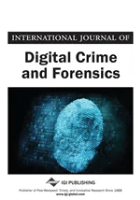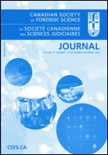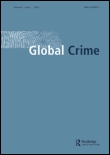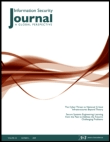
International Journal of Digital Crime and Forensics
Scope & Guideline
Elevating Standards in Cybercrime Research
Introduction
Aims and Scopes
- Digital Forensics Techniques:
The journal emphasizes innovative methodologies in digital forensics, including the development of new tools and techniques for evidence collection, analysis, and interpretation in various digital environments. - Cybersecurity and Information Assurance:
Research focusing on the protection of digital information and systems from cyber threats is a core area, highlighting strategies for securing data and maintaining privacy in digital communications. - Machine Learning and Artificial Intelligence Applications:
The application of machine learning and AI in enhancing forensic processes and cybersecurity measures is prominently featured, showcasing how these technologies can improve detection, analysis, and prediction of criminal behavior. - Emerging Technologies in Forensics:
The journal explores the implications of new technologies, such as IoT, UAVs, and edge computing, on forensic practices, addressing how these tools can be leveraged for criminal investigations. - Behavioral Analysis and Threat Detection:
Research related to understanding user behavior and identifying abnormal activities in digital environments is a significant focus, contributing to the development of proactive security measures.
Trending and Emerging
- Integration of Machine Learning in Forensics:
There is a significant increase in research that applies machine learning algorithms to forensic analysis, enhancing the ability to detect anomalies and automate evidence analysis. - Edge Computing in Forensic Applications:
Recent publications have explored the role of edge computing in digital forensics, particularly in relation to mobile and vehicular networks, reflecting a trend towards decentralized data processing. - Cyber-Physical Systems and Forensics:
The intersection of cyber-physical systems with forensic practices is gaining traction, as researchers investigate how to secure and analyze data from interconnected devices. - Video and Image Forensics:
An increasing number of studies focus on video and image forensics, specifically in the areas of deepfake detection and tampering analysis, highlighting the importance of visual data integrity. - Privacy-Preserving Forensic Techniques:
Emerging themes include the development of privacy-preserving frameworks that ensure the security and confidentiality of sensitive information during forensic investigations.
Declining or Waning
- Traditional Forensic Techniques:
There is a noticeable reduction in publications focusing on traditional forensic methods, as the field shifts towards more technologically advanced approaches that incorporate AI and machine learning. - General Cybersecurity Practices:
While cybersecurity remains a priority, the journal has seen a decrease in papers discussing generic cybersecurity measures, with a shift towards specialized applications and innovative solutions. - Static Analysis Methods:
Research centered on static analysis techniques for security and forensics has declined, likely due to the rising interest in dynamic and machine learning-based analysis methods that offer more robust solutions. - Basic Data Recovery Techniques:
The focus on conventional data recovery techniques has diminished as researchers increasingly explore more complex and advanced retrieval methods that integrate new technologies.
Similar Journals

Canadian Society of Forensic Science Journal
Advancing Forensic Knowledge Since 1968The Canadian Society of Forensic Science Journal, published by Routledge Journals, Taylor & Francis Ltd, serves as a vital platform for the dissemination of research in the field of forensic science, particularly focusing on pathology and forensic medicine. With a rich history since 1968 and an impressive commitment to academic rigor, this journal has established itself as an essential resource for researchers, practitioners, and students alike. Recognized within the Q3 category in the 2023 Scimago Journal Rank in Pathology and Forensic Medicine, it ranks #162 out of 208 journals in its category, affirming its relevance and contribution to the field. While it does not operate under an open access model, the journal remains accessible through institutions and libraries and provides critical insights into advancements and best practices in forensic science. Through its comprehensive approach, the journal aims to advance forensic knowledge and contribute to the professional development of those engaged in this pivotal area of study.

Journal of Forensic and Legal Medicine
Championing Excellence in Forensic and Legal Research.The Journal of Forensic and Legal Medicine, published by Elsevier, stands at the forefront of interdisciplinary research in the overlapping domains of law, medicine, and forensic science. With an ISSN of 1752-928X and an E-ISSN of 1532-2009, this esteemed journal covers pivotal advancements in the field, spanning from 2007 to 2024. The journal enjoys a distinguished reputation, evidenced by its Q1 ranking in Law and its notable positions in the Scopus Ranks with an 82nd percentile in Social Sciences—Law. As a crucial resource for researchers, practitioners, and students alike, the journal focuses on the vital role of forensic evidence in legal contexts, ensuring the dissemination of high-quality, peer-reviewed articles that contribute to both academic and practical applications in the realm of forensic and legal medicine. Its accessibility to a broad audience, despite not being open access, bolsters its importance in advancing forensic science, policy-making, and medical jurisprudence worldwide.

Journal of Digital Forensics Security and Law
Navigating the Intersection of Technology and Law.Journal of Digital Forensics, Security and Law is a prominent open-access journal dedicated to the rapidly evolving fields of digital forensics, cybersecurity, and legal issues related to digital evidence. Published by the Association of Digital Forensics, Security & Law, the journal aims to create a central hub for researchers, practitioners, and educators to share knowledge, innovative methodologies, and the latest advancements in these interdisciplinary areas. With an ISSN of 1558-7215 and an E-ISSN of 1558-7223, this journal has been serving the academic community since 2013, providing unrestricted access to groundbreaking research that addresses the complexities of security and law in the digital age. The importance of this journal lies in its commitment to enhancing the understanding of legal frameworks and investigative techniques that safeguard digital assets while maintaining compliance with evolving regulations. Researchers, professionals, and students alike will find valuable insights and practical applications within its pages, contributing to the ongoing dialogue surrounding digital forensics and cybersecurity.

Global Crime
Connecting Disciplines to Transform Criminal JusticeGlobal Crime is a leading scholarly journal published by Routledge Journals, Taylor & Francis Ltd, focusing on the multifaceted dimensions of crime and justice on a global scale. With an ISSN of 1744-0572 and E-ISSN of 1744-0580, this journal serves as a critical platform for researchers, practitioners, and policymakers interested in the intersection of legal studies, political science, and sociological perspectives. The journal boasts a prestigious Q1 ranking in Law and notable Q2 rankings in Political Science and International Relations, as well as Sociology, highlighting its influential role in shaping academic discourse. In 2023, it ranked #88 out of 1025 journals in Law, placing it in the 91st percentile, thus ensuring its status as an essential resource for those engaged in advanced research. While it does not currently offer open access options, Global Crime continuously seeks to illuminate the complexities of crime, fostering a better understanding through comprehensive studies, critical analyses, and innovative approaches. By converging insights from various disciplines, the journal aims to facilitate dialogue among academics and practitioners alike, ultimately advancing the field of criminal justice globally.

Information Security Journal
Exploring Innovative Solutions in Cybersecurity.The Information Security Journal, published by Taylor & Francis Inc, is a pioneering platform dedicated to disseminating knowledge in the realms of information security, computer science applications, and information systems management. With an ISSN of 1939-3555 and an E-ISSN of 1939-3547, this journal has successfully carved its niche within the Q2 quartile of the 2023 rankings for both Computer Science Applications and Information Systems and Management, while also being recognized in Q3 for the Software category. Located in the United Kingdom, the journal has been committed to advancing research and fostering innovation from 2008 through 2024, making it an essential resource for academics and professionals alike. With a significant Scopus ranking in its fields—placing 43rd out of 148 in Decision Sciences and 271st out of 817 in Computer Science Applications—the journal stands as a vital source of interdisciplinary insights. Although it does not currently offer open access options, the quality of publications and the journal's dedication to the field ensure that it remains a compelling choice for researchers seeking to publish their findings or stay abreast of current developments in information security.

Forensic Science International-Digital Investigation
Bridging Disciplines for a Safer Digital WorldForensic Science International-Digital Investigation, published by Elsevier Science Ltd, stands at the forefront of multidisciplinary research in the realm of digital forensics and forensic science. With an impressive impact factor and recognition as a Q1 journal in critical categories such as Law and Medical Laboratory Technology, it has established itself as an essential resource for researchers, practitioners, and students alike. Its open access policy promotes broad dissemination of cutting-edge findings, facilitating collaboration and innovation in this ever-evolving field. Covering topics from computer science applications to forensic medicine, it addresses the complexities of digital evidence analysis in today's technology-driven world. As it converges from 2020 to 2024, the journal reflects ongoing advancements and profound challenges faced in forensic investigations, making it a vital platform for sharing knowledge and fostering scholarly dialogue.

Forensic Chemistry
Unveiling truths with cutting-edge forensic analysis.Forensic Chemistry is a premier journal published by Elsevier, specializing in the interdisciplinary field of forensic science, with a strong emphasis on analytical and materials chemistry, pathology, and law. Established in 2016 and converging to a significant publication trajectory through 2024, the journal has rapidly ascended to an impressive Q1 ranking across multiple categories, demonstrating its impact and commitment to advancing forensic analysis and methodologies. With an impact factor reflecting its relevance—especially notable with a 95th percentile rank in Social Sciences and Law—Forensic Chemistry serves as an essential resource for researchers, legal authorities, and academics seeking to explore the latest developments in forensic techniques and applications. Its rigorous peer-review process and high-quality publications ensure that it remains at the forefront of scientific inquiry in forensic practices. Access to the journal is available without an open access model, further emphasizing its commitment to curated, high-impact scholarship that contributes to both theoretical foundations and practical applications in the forensic field.

International Journal of Cyber Criminology
Innovating solutions for a safer digital world.International Journal of Cyber Criminology is a premier open-access journal dedicated to advancing the field of cyber criminology, publishing cutting-edge research that addresses the intricate relationship between technology and crime. Established in 2007 and published under the esteemed guidance of K Jaishankar, this journal serves as a fundamental resource for researchers, professionals, and students engaged in the study of cybercrime, online security, and digital justice. With an impressive ranking in the Q2 quartile in Law and a notable 81st percentile in Scopus Ranks, it reflects its commitment to high-quality scholarship and impact within the academic community. The journal aims to foster interdisciplinary dialogue and innovative solutions to contemporary cybercrime challenges while supporting free access to knowledge. Hailing from Manonmaniam Sundaranar University in Tamil Nadu, India, the International Journal of Cyber Criminology exemplifies a global perspective on issues affecting society in the digital age, making it an essential publication for those seeking to understand and combat cyber threats.

BEHAVIORAL SCIENCES & THE LAW
Transforming Legal Understanding Through Behavioral ResearchBehavioral Sciences & The Law is a premier interdisciplinary journal published by Wiley, dedicated to exploring the intricate relationships between behavioral sciences and legal systems. Established in 1983 and continuing through 2024, this journal provides a vital platform for researchers, professionals, and students in the fields of law, clinical psychology, medicine, and psychiatry. With an impressive impact factor reflected in its Q1 ranking in Law and Q3 in Clinical Psychology, Psychiatry, and Medicine, it stands out in the academic community, facilitating scholarly discourse and advancing understanding in these critical areas. While currently not following an open access model, the journal’s reach is extensive, delivering cutting-edge research and thought leadership from the United Kingdom to a global audience. Whether you are investigating the psychological dimensions of legal practice or the implications of law on behavioral health, Behavioral Sciences & The Law remains an essential resource for those committed to the intersection of these disciplines.

PSYCHOLOGY CRIME & LAW
Advancing Understanding at the Intersection of Psychology and LawPSYCHOLOGY CRIME & LAW, published by Routledge Journals, Taylor & Francis Ltd, is a premier academic journal dedicated to the intersection of psychology, criminology, and the law. With an ISSN of 1068-316X and an E-ISSN of 1477-2744, this journal provides a critical platform for the dissemination of cutting-edge research and innovative methodologies in the fields of psychology, forensic medicine, and legal studies. Spanning over three decades (1994 to 2024), it holds impressive Scopus rankings, placing it in Q1 and Q2 quartiles for its contributions to law and forensic medicine, highlighting its standing within the academic community. PSYCHOLOGY CRIME & LAW is particularly noted for addressing contemporary issues at the crossroads of human behavior and legal standards, making it essential reading for scholars, practitioners, and students alike. While the journal is not open access, it offers valuable insights into a variety of topics, from criminal psychology to the implications of mental health in legal contexts, ensuring that it remains an influential resource for those engaged in research and professional practice.